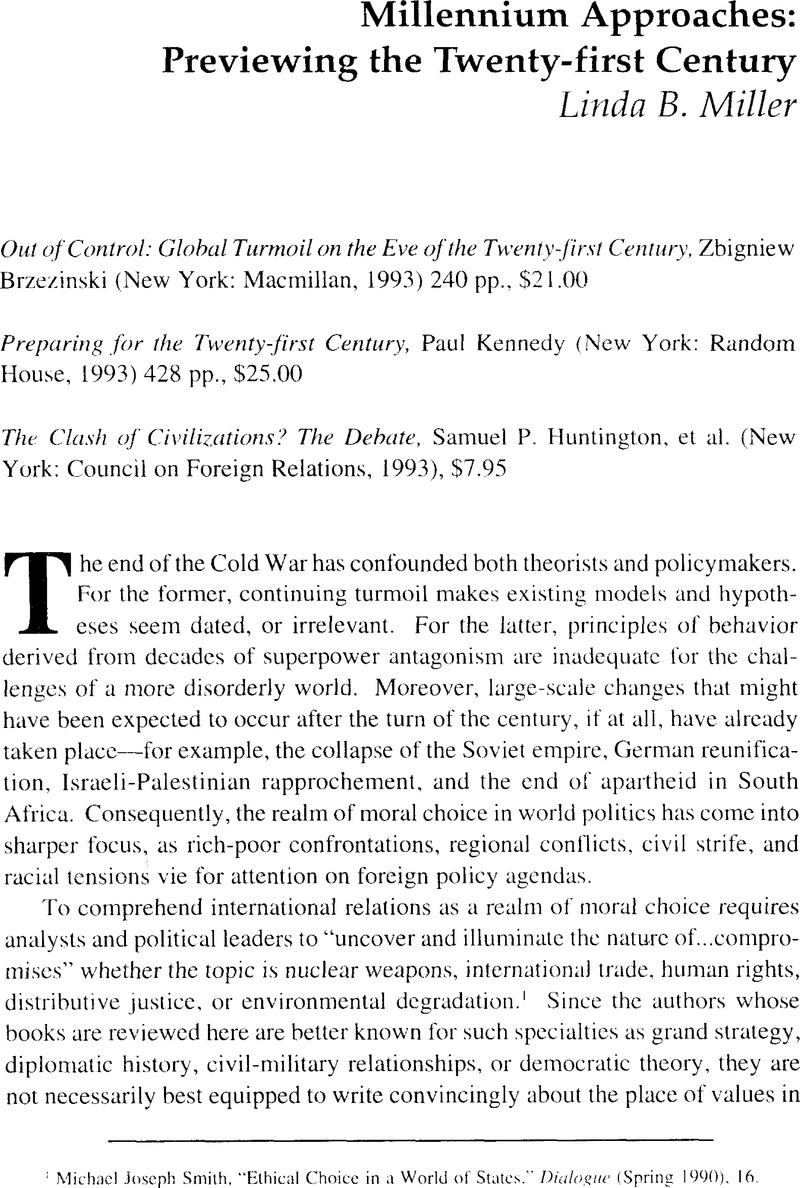Article contents
Millennium Approaches: Previewing the Twenty-first Century
Published online by Cambridge University Press: 28 September 2012
Abstract

- Type
- Review Essay
- Information
- Copyright
- Copyright © Carnegie Council for Ethics in International Affairs 1994
References
1 Michael Joseph Smith, “Ethical Choice in a World of States.”Dialogue (Spring 1990), 16.
2 For a fuller discussion of this assumption, see Kegley, Charles W. Jr., “The New Global Order: The Power of Principle in a Pluralistic World,” Ethics & International Affairs 6 (1992). 21–40CrossRefGoogle Scholar.
3 For an analysis of why American preeminence may undercut the prospects tor world order, see the still authoritative explanation in Stanley Hoffmann. Primacy or World Order: American Foreign Policy Since the Cold War (New York: McGraw-Hill, 1978).
4 For two recent attempts to activate this debate, see Layne, Christopher and Schwartz, Benjamin, “American Hegemony Without an Enemy,” Foreign Policy 92 (Fall 1993), 5–23CrossRefGoogle Scholar, and Maynes, Charles William, “A Workable Clinton Doctrine,” Foreign Policy 93 (Winter 1993–94), 3–21Google Scholar.
5 For a useful summary of the declinist literature, see Thompson, Kenneth W., “The Literature of Decline,” Ethics & International Affairs 3 (1989), 303–15CrossRefGoogle Scholar.
6 Michael Ignatieff, “The Balkan Tragedy,”New York Review of Books, May 13, 1993, p. 5.
7 These contradictions arc delineated in Stanley Hoffmann, “Delusions of World Order.”New York Review of Books, April 19. 1992.
8 These phrases appear in Nolan, Cathal J., “The United States. Moral Norms, and Governing Ideas in World Politics: A Review Essay.” Ethics & International Affairs 7 (1993). 223–39CrossRefGoogle Scholar.
9 On the theme of “underperformance,” see also Peter F. Drucker, Post-Capitalist Society (New York: Harper Business, 1993). chs. 6–8.
10 A thorough review of these traditions is provided in Terry Nardin and David R. Mapel, eds., Traditions of International Ethics (Cambridge: Cambridge University Press, 1992).
11 Vaclav Havel, “How Europe Could Fail,”New York Review of Books, November 18, 1993, p. 3.
12 Stanley Hoffmann. Duties Beyond Borders: On the Limits and Possibilities ol Ethical Interna-tional Politics (Syracuse: Syracuse University Press, 1981), 22.
13 Farhad Karim, Letter to the Editor, New York Times, December 22, 1993.
14 See Charles William Maynes, “Realpolitik for the “90s,”New York Times, op-ed, December 22, 1993. Also see John Lukacs, The End of the Twentieth Century (New York: Tickner and Fields, 1993), chaps. 9–10.
15 The phrase is James Rosenau's in “Normative Considerations for Students of World Politics,”Moral Education III (New York: Carnegie Council on Ethics and International Affairs, 1993), 4; reprinted in Ethics & International Affairs newsletter 15 (Spring 1993), 4.
- 1
- Cited by


